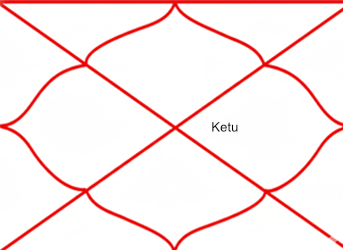When Ketu is placed in the Third House of a birth chart, it brings a mysterious and introspective influence to one’s communication, courage, siblings, and efforts. The Third House represents how you express yourself, how you face challenges, your relationship with siblings, and your overall drive to act in the world.
Ketu, being a planet of detachment and spiritual depth, doesn’t operate well in the domain of action and communication — areas that belong more to worldly engagement. As a result, people with this placement often experience confusion in expressing themselves, changes in relations with siblings, and an unusual approach to ambition or courage.
General Meaning of Ketu in Third House
Ketu in the Third House creates a person who is independent in thought, yet inwardly reserved. Such natives often prefer silence over unnecessary talk and may have a unique way of communicating — sometimes deep and philosophical, other times distant or unclear.
They may lack interest in competition or proving themselves to others. Instead, they act only when they feel a genuine inner calling. The third house is about effort, and Ketu brings detachment, so these natives may either put in effort irregularly or feel that their hard work doesn’t bring expected results until later in life.
Personality and Behavior
-
Reserved Communicator:
These people often choose their words carefully. They might seem quiet or secretive, not because they have nothing to say, but because they think deeply before speaking. -
Unique Courage:
Ketu here gives courage of a different kind — mental and spiritual bravery. They may not be loud or aggressive, but they can face emotional and spiritual challenges fearlessly. -
Inner Confidence with Outward Detachment:
Sometimes, Ketu makes the person appear less confident or uninterested in worldly success, but inside, they carry a quiet strength and strong willpower.
Relationship with Siblings
The Third House also governs siblings, and Ketu here can cause distance or karmic tension with brothers or sisters. There might be misunderstandings, separations, or a feeling of emotional disconnection in early life.
However, this doesn’t always mean bad relationships — it often indicates spiritual lessons through siblings. Later in life, bonds may improve, especially when the native learns to accept others without expectations.
Communication and Creative Expression
Ketu in this house makes communication unconventional or mystical. These natives may have a deep interest in writing, poetry, philosophy, or spirituality. Their way of expressing themselves is unique — often deep, reflective, and filled with meaning.
However, early in life, they might struggle to express thoughts clearly or face misunderstandings. Once mature, their words can carry great power and wisdom.
Courage, Efforts, and Career
Since the Third House represents initiative and self-effort, Ketu’s influence can make the person hesitant or inconsistentin pursuing goals. They may start projects enthusiastically but lose interest halfway, especially if the work feels meaningless or materialistic.
These natives perform best when their efforts are aligned with spiritual, creative, or research-oriented goals. They might excel in astrology, writing, healing, or analytical professions where intuition and insight matter more than competition.
Positive Effects of Ketu in Third House
-
Fearless in facing inner challenges
-
Deep and meaningful communication style
-
Strong intuitive and creative talents
-
Ability to work independently
-
Non-materialistic and spiritually courageous personality
Negative Effects of Ketu in Third House
-
Lack of consistent effort or focus
-
Communication gaps or misunderstandings
-
Distance from siblings or family
-
Disinterest in social or competitive environments
-
Hidden anxiety or lack of motivation
Remedies for Ketu in Third House
-
Chant “Om Ketave Namah” or “Om Sram Srim Sraum Sah Ketave Namah” regularly.
-
Offer food or service to monks, saints, or spiritual teachers.
-
Maintain good relations with siblings, even if differences exist.
-
Avoid gossip and harsh speech — use words consciously.
-
Meditate or practice yoga to strengthen focus and inner balance.
Final Thoughts
Ketu in the Third House teaches the lesson of acting with awareness rather than impulse. It detaches the person from unnecessary competition and encourages them to work for inner satisfaction instead of outer recognition.
Though early life may bring confusion in communication or self-confidence, maturity brings wisdom, calmness, and a deeper understanding of life’s true purpose.
Such individuals are quiet achievers — they may not seek fame, but their actions and insights leave a lasting spiritual impact on others.





